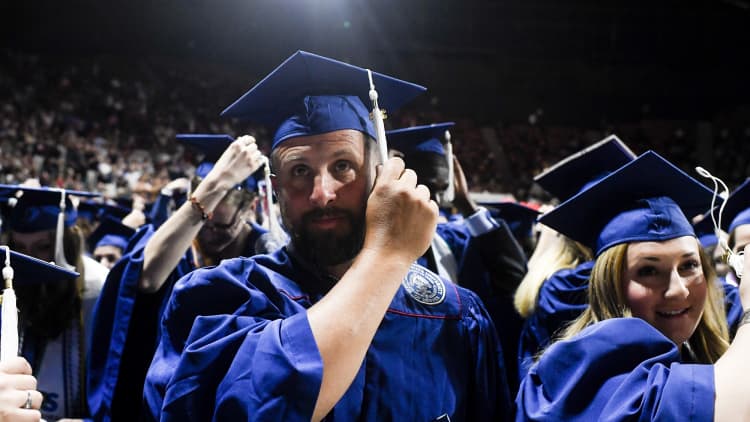As fall begins, kindergartners are just starting their first days of school. But it's never too early to start thinking ahead to college. At least if you live in Boston.
This school year, the city of Boston gave all kindergartners enrolled in Boston Public Schools a savings account with $50 to be used for college or career training costs when they graduate from high school.
The move is part of an expansion of the city's Boston Saves program, which aims to help families plan for their children's educational futures.
Policymakers say it's not the sum of money that is particularly important, but rather the way it motivates students to complete their secondary educations and encourages parents to begin saving early.
"Even though Boston Saves is giving people money, this is really a tool to get families started thinking about the future now," Gosia Tomaszewska, the senior program manager of Boston Saves tells CNBC Make It.
There are some additional incentives for parents that go beyond the initial $50, but in the end it won't be enough for college on its own, she says.
"We know college tuition is so high. It's really about getting people thinking, encouraging parents to save and supporting students," she says.
"Every child deserves to hear the message, 'We believe in you, and you can do anything' from the first minute they walk through our school doors,'" says Brenda Cassellius, superintendent of BPS. "The Boston Saves program helps us send that message."
Boston Saves was inspired by similar programs, like one in San Francisco, and launched as a pilot program in 2016 with five schools before slowly expanding. This year marks the biggest expansion of the initiative, with all 80 public schools in Boston that have kindergarten classes participating.
"Boston Saves has proven to be an essential part of providing families with the tools to save for their children's post-secondary future," says Boston Mayor Martin Walsh in a press release. "I am pleased to announce the citywide expansion of Boston Saves, providing more families with these resources and strengthening the investment we are making in Boston's youth."
Tomaszewska cites research that found low-income children with less than $500 in an account dedicated to higher education were three times more likely to enroll in college and four times more likely to graduate from college than those who hadn't saved at all.
Once students are a part of the Boston Saves program, families can earn relatively small amounts of "Boston Saves Dollars" by taking steps such as opening a savings, checking or 529 account for their student's college funds. For instance, families that save $25 over a three-month period can earn an additional $5 from Boston Saves. Based on current projections, if a family saved the bare minimum to earn all of the incentives for 13 years, they would earn approximately $1,895 Boston Saves Dollars.
"My family's participation in the Boston Saves program has brought up important family discussions about college and financial planning early on," says Esmirna Soto, the parent of a student at Roosevelt School, which participated in the Boston Saves pilot, in a statement. "The experience has been great because the earlier we save, the more our child will benefit over time. He benefits by knowing that we are not only expecting him to attend college or some form of higher education, but that we are also financially planning for it."
Economists estimate that approximately 75% of jobs in Boston require some education beyond high school. At the same time, Massachusetts is also home to some of the highest college costs.
Last year, Americans spent an average of $26,226 on college, covered with a combination of loans, scholarships and savings. Vanguard estimates that college costs increase by about 5% each year on average. If this rate of inflation continues, college will cost roughly $49,528 some 13 years from now, when today's kindergartners will be graduating high school and starting their college careers.
Tomaszewska says Boston Saves is just one part of addressing this wider problem.
"There is a bigger issue of the cost of college," she says. "We're just kind of a small — but hopefully significant — part of solving that equation."
Like this story? Subscribe to CNBC Make It on YouTube!
Don't miss:



